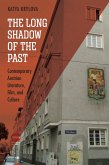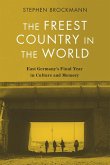Illuminates tensions and transformations in today's Germany by examining literary, filmic, and musical treatments of the ghetto metaphor.
Accounts of how Germany has changed since unification often portray the Berlin Republic as a new Germany that has left the Nazi past and Cold War division behind and entered the new millennium as a peaceful, worldly, and cautiously proud nation. Closer inspection, however, reveals tensions between such views and the realities of a country that continues to struggle with racism, provincialism, and fear of the perceived Other. Mainstream media foster such fears by describing violence in ghetto schools, failed integration, and the loss of society's core values. The city emerges as a key site not only of ethnic and political tension but of social change.
Maria Stehle illuminates these tensions and transformations by following the metaphor of the ghetto in literary works from the 1990s by Feridun Zaimoglu, in German ghettocentric films from the late 1990s and the early twenty-first century, and in hip-hop and rap music of the same periods. In their representations of ghettos, authors, filmmakers, musicians, and performers redefine and challenge provincialism and nationalism and employ transcultural frameworks for their diverging political agendas. By contextualizing these discussions within social and political developments, this study illuminates the complexities that define Germany today for scholars and students across the disciplines of German, European,cultural, urban, and media studies.
Maria Stehle is Assistant Professor of German at the University of Tennessee, Knoxville.
Accounts of how Germany has changed since unification often portray the Berlin Republic as a new Germany that has left the Nazi past and Cold War division behind and entered the new millennium as a peaceful, worldly, and cautiously proud nation. Closer inspection, however, reveals tensions between such views and the realities of a country that continues to struggle with racism, provincialism, and fear of the perceived Other. Mainstream media foster such fears by describing violence in ghetto schools, failed integration, and the loss of society's core values. The city emerges as a key site not only of ethnic and political tension but of social change.
Maria Stehle illuminates these tensions and transformations by following the metaphor of the ghetto in literary works from the 1990s by Feridun Zaimoglu, in German ghettocentric films from the late 1990s and the early twenty-first century, and in hip-hop and rap music of the same periods. In their representations of ghettos, authors, filmmakers, musicians, and performers redefine and challenge provincialism and nationalism and employ transcultural frameworks for their diverging political agendas. By contextualizing these discussions within social and political developments, this study illuminates the complexities that define Germany today for scholars and students across the disciplines of German, European,cultural, urban, and media studies.
Maria Stehle is Assistant Professor of German at the University of Tennessee, Knoxville.
Dieser Download kann aus rechtlichen Gründen nur mit Rechnungsadresse in A, D ausgeliefert werden.









